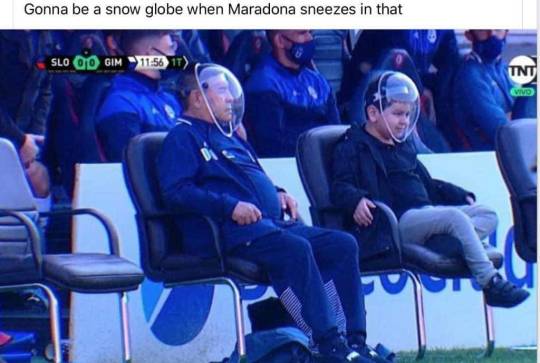#maradona cocain
Text
Gil def has jackass pro athlete energy like he'd get famous from sports and then be such a ahit head
#renowed footballer g beilschmidt dead at 32 from massive heart attack from cocaine abuse#a la maradona baby
5 notes
·
View notes
Text
Drugs Series - lead by example
May someone judge and still gossiping around an intense life of Diego Armando Maradona
They use to blame is as like the most dangerous and bad example about his life
The God who chose to became an human being like everyone else
A gifted player able to move wave of people first in South America – Spain – Italy and world wide
He left Barcelona on his peak moved to Naples – a place of nowhere –…

View On WordPress
0 notes
Text
“When Maradona said he wanted to leave Napoli, some people tossed wax dolls stuck with pins through his window. Prisoner of the city that adored him, and of the Camorra, the Mafia that owns it, he was playing against his heart, against his feet. That's when the cocaine scandal erupted, and Maradona suddenly became Maracoca, a delinquent who had fooled people into thinking he was a hero.
Later on in Buenos Aires the media gave a further twist to the knife: live coverage of his arrest, as if it were a match, to the delight of those who love the spectacle of a king disrobed and carted off by the police.
"He's sick," they said. They said, "He's done for." The Messiah who came to redeem southern Italians from their eternal damnation was also the avenger of Argentina's defeat in the Falklands by means of one sneaky goal and another fabulous one that left the English spinning like tops for several years. But when he fell, the Golden Boy was nothing but a numb-nosed, whoring phony. Maradona had betrayed the children who adored him and brought dishonor on the sport. They gave him up for dead.
But the body sat up. Once he had served his cocaine sentence, Maradona became the fireman of the Argentine squad, which was burning up its last chances to reach the '94 World Cup. Thanks to Maradona, they made it. And at the Cup once again, as in the old days, Maradona was the best of the best until the ephedrine scandal hit.
The machinery of power had sworn to get him. He spoke truth to power and you pay a price for that, a price paid in cash with no discount. And Maradona himself gave them the excuse, with his suicidal tendency to serve himself up on a platter to his many enemies and that childish irresponsibility that makes him step in every trap laid in his path.
The same reporters who harass him with their microphones, reproach him for his arrogance and his tantrums, and accuse him of talking too much. They aren't wrong, but that's not why they can't forgive him: what they really do not like are the things he sometimes says. This hot-tempered little wiseacre has the habit of throwing uppercuts. In '86 and '94, in Mexico and the United States, he complained about the omnipotent dictatorship of television, which forced the players to work themselves to the bone at noon, roasting under the sun. And on a thousand and one other occasions, throughout the ups and downs of his career, Maradona said things that stirred up the hornet's nest. He wasn't the only disobedient player, but his was the voice that made the most offensive questions ring out loud and clear: Why aren't the international standards for labor rights applied to football? If it's standard practice for performers to know how much money their shows bring in, why can't the players have access to the books of the opulent multinational of football? Havelange, busy with other duties, kept his mouth shut, while Joseph Blatter, a FIFA bureaucrat who never once kicked a ball but goes about in a twenty-five-foot limousine driven by a black chauffeur, had but one comment: "The last star from Argentina was Di Stéfano."
When Maradona was finally thrown out of the '94 World Cup, football lost its most strident rebel. And also a fantastic player. Maradona is uncontrollable when he speaks, but much more so when he plays. No one can predict the devilish tricks this inventor of surprises will dream up for the simple joy of throwing the computers off track, tricks he never repeats. He's not quick, more like a short-legged bull, but he carries the ball sewn to his foot and he has eyes all over his body. His acrobatics light up the field. He can win a match with a thundering blast when his back is to the goal, or with an impossible pass from afar when he is corralled by thousands of enemy legs. And no one can stop him when he decides to dribble upfield.
In the frigid football of today's world, which detests defeat and forbids all fun, that man was one of the few who proved that fantasy too can be effective.”
Eduardo Galeano on Maradona, From Football in Sun And Shadow
#feliz cumpleaños Diego#Diego Maradona#Maradona#eduardo galeano#football in sun and shadow#fútbol a sol y sombra#Argentina
5 notes
·
View notes
Text
"messi will never be maradona"
i hope messi will leave the cocaine, alcohol, italian mafia and jail sentences alone until he's at least retired.
5 notes
·
View notes
Text
Why did nobody tell me that Mario Cipollini was actually trying to get Marco into a rehab clinic back in the day?
Why did nobody tell me that Mario got Maradona involved too? Because Maradona knew what Marco was going through because of his own cocaine addiction.
Why did nobody tell me that Marco died only a few days before they were due to meet?
Why did nobody tell me that Maradona said: "How could god allow for something like that to happen?" about Marco's death?
#marco pantani#mario cipollini#diego maradona#cycling history#cycling stuff#cycling#rip marco#nice to know that he had people trying to help him#sad to know that they were ultimately unable to help
3 notes
·
View notes
Note
why is maradona so beloved in italy? i keep seeing vids
His time with Napoli was pretty iconic.
While he was part of the team, Napoli managed to win Serie A twice, the Coppa Italia once, and also won the UEFA Cup.
His time in Italy ended on a pretty infamous note because his career hit a decline following a doping test that came back positive for cocaine after one of his final games with Napoli.
1 note
·
View note
Text
Could not watch SNW soo I switched to the Mundial….
HOLY FUCK!!! Boludas, que carajo?! I mean, not a fan of Argentina but…. Damn?! What in the name of Maradona’s cocaine is happening?!! Did someone forget to tell South Africa who Argentina is?
EDIT:: this was written at Arg0- SA2
Guess the Boludas remembered who they represented 😂
#fifa wwc#fifawwc2023#fifa women’s world cup 2023#women’s world cup 2023#argentina#south africa#boludas
0 notes
Text
Where does Lionel Messi rank among the all-time greats?

At his fifth and final attempt, Lionel Messi finally managed to achieve the ultimate goal: winning the world cup. In a game that didn't seem worthy of a final for almost 80 minutes, the Argentine guided his team to the biggest prize of them all. Many fans and analysts agree that this triumph makes clear once and for all who the GOAT (Greatest Of All Time) really is. But how does Messi compare to other iconic players such as Pelé, fellow countryman Diego Maradona, and long-time rival Cristiano Ronaldo? Let's find out by listing the greats.
Lionel Messi: starting off with the main man himself. The World Cup was the one missing jewel on his already magnificent crown. After enduring one heartbreak after another for many years, Messi finally managed to win some international trophies with Argentina in the twilight of his career. Although the 2021 Copa America and the 2022 World Cup are also the merit of goalkeeper Emiliano Martinez and coach Lionel Scaloni, among others, Messi had a massive part to play in both triumphs. The stats speak for themselves: at the Copa America, he scored 4 goals (joint-most) and produced 5 assists (most). At the World Cup, he scored 7 goals (2nd most) and produced 3 assists (joint-most). He is not only Argentina's all-time top scorer with 98 goals in 172 appearances, but also FC Barcelona's, with 672 goals in 778 games. And stats do not say everything, of course, as the versatile forward is equally well-known for displaying some of the most wonderful pieces of skill ever seen. Having now won literally everything at both international and club level, as well as a record 7 Ballon d'Ors, Messi certainly is a safe choice to pick as your GOAT.
Diego Maradona: for a long time, the World Cup seemed to be the only prize separating Messi from his illustrous predecessor. Maradona almost single-handedly won football's biggest trophy for Argentina in 1986, scoring 5 goals and being crowned the tournament's best player in the process. That particular tournament is generally seen as the absolute highlight of Maradona's career, although his surprising move to Napoli in 1984, resulting in the club's two only league titles, definetely deserves an honorable mention as well. Unfortunately, the Argentinian icon's name is also linked to less sportsmanlike affairs, such as a cocaine addiction and the infamous "Hand of God" goal. Nevertheless, Maradona's glorious achievements on the pitch will forever mark him as one of the absolute best to ever kick a ball.
Pelé: 3 World Cup trophies, 12 World Cup goals, over 1 000 career goals in total... Pelé's numbers speak for themselves. Football's first global star is still considered to be the GOAT by many people, including himself. The Brazilian icon spent most of his career with Santos, which he helped win five consecutive league titles between 1961 and 1965 and a sixth one in 1968. The forward was even declared a "national treasure" by the Brazilian president, which prevented him from being transferred out of the country. Nowadays, the fact that he never got the chance to prove himself at a European club casts doubts over his status as "the best ever", although the whole world could witness Pelé's massive talent and goalscoring ability at some of the most iconic World Cups to date.
Johan Cruyff: one of the "classic three", together with Maradona and Pelé. The Dutchman's outstanding set of skills and goalscoring ability made him by far the best European player of his generation, with no less than 3 Ballon d'Ors to show for it. Thanks to his tactical insight, he was not only one of the most successful players, but also one of the cleverest managers of all time. A genius on the pitch and next to it, Cruyff left a legacy worthy of a true GOAT. If only his heroics at the 1974 World Cup weren't met with an unyielding West-German side in the final...
Ronaldo: the Brazilian one, to be clear. Nicknamed Il Fenomeno, Ronaldo was arguably the greatest talent of his generation - and perhaps even of all time. Playing for diverse European clubs, including both AC Milan and Inter Milan, as well as FC Barcelona and Real Madrid, the Brazilian won over the hearts of football fans all around with extraordinary skills and countless goals. His heroics at the 2002 World Cup included 8 of his record-breaking total of 15 World Cup goals. Surprisingly, Ronaldo never managed to win the Champions League, not even after joining Real Madrid's galácticos. Football fans can only imagine how astronomical his already phenomenal career would have been if it weren't for the recurring knee injuries that kept him off the pitch for so long and that would eventually bring an end to his footballing days.
Zinédine Zidane: few players in history were lucky enough to be as technically gifted as Zidane. The midfield maestro showcased his extraordinary dribbling skills in France, Italy and Spain, collecting numerous trophies as well as individual awards on the way. Above that, he guided the French national team to triumphs in the 2000 European Championship and the 1998 World Cup. He came dramatically close to a second world title in 2006, but in what remains one of the most notorious moments in sports history, Zidane got sent off in the final after headbutting Italian defender Marco Materazzi. It was an action the French icon will undoubtedly regret, as his side would go on to lose on penalties.
Cristiano Ronaldo: a born winner, a goal machine, a record breaker on all levels... there are many ways to describe Cristiano Ronaldo. Despite being born with significantly less talent than some of the names on this list, the Portuguese forward worked extremely hard to achieve his dreams. His trophy cabinet reveals that the hard work paid off: 5 Champions League trophies, 5 Ballon d'Ors, numerous league titles in various European competitions... Ronaldo also holds the record for top scorer in men's football, with no less than 118 goals. Once a feared winger, CR7 has in recent years restricted his game to simply scoring as many goals as possible. Unfortunately for Ronaldo, his change in playing style has been making it difficult to adapt to his teammates as of late, both internationally and on a club level. It must be difficult for the proud Portuguese to have to watch his long-time Argentinian adversary, who is getting older as well, develop a more pronounced playmaking dimension to his game while also catching up with him in terms of international success - and even winning the one trophy Ronaldo could never lay his hands on. Despite being a phenomenal player with a monumental career, Ronaldo might have been remembered as the GOAT if only he didn't have to play in the exact same era as Lionel Messi...
Conclusion: Lionel Messi had already earned a place among the greatest footballers of all time, but he might have just taken the top spot after his most recent - and perhaps most impressive - accomplishment. Having collected the one piece missing from his illustrous trophy cabinet, the Argentine arguably has the most complete and most impressive career of them all. After all, someone has to be the best, and his unmatched achievements are proof that Messi certainly wouldn't have stolen that title.
0 notes
Text
Claudio Caniggia's stolen jersey, which he wore to score and knock Italy out in the 1990 World Cup, recovered, 'Claudio excited happy!'
Claudio Caniggia’s stolen jersey, which he wore to score and knock Italy out in the 1990 World Cup, recovered, ‘Claudio excited happy!’
Remember Claudio Caniggia, known to Argentina as El Hilo del Vent (The Sun of the Wind), with his golden locks twirling and twisting his way? A good friend of Diego Maradona, he was once banned for 13 months in 1993 for taking cocaine.
The El Pajaro (The Bird, another nickname) jersey he wore during the 1990 World Cup in Italy was stolen from his father’s home in Buenos Aires. In which he also…
View On WordPress
0 notes
Text
“Badlands” Podcast Returns With Athletes Behaving Badly
Can you imagine a podcast that focuses on famous athletes behaving badly? The choices are endless. And no sport is exempt. From betting scandals in tennis to almost weekly scandals in the NFL, it’s sad that the high standards we set for our athletic heroes are too often crushed by reality.
That’s why the newest season of Badlands, hosted by Jake Brennan will be so delightful. New episodes premiere on October 26th across all podcast platforms. As a bonus, Amazon Music listeners can binge all 10 episodes of the new season, on-demand on 10/26.
The trailer for this season of Badlands is now live, and you can listen to it HERE.
Badlands is a true-crime podcast that dives deep into the real stories of some of the most famous popular culture figures, their real life crimes and scandalous careers. The all-new special season will tell the stories of legendary athletes whose misdeeds off the field are as unbelievable as some of their record-breaking plays. Brennan will explore stories about Michael Vick, Ray Lewis, Joe Namath, Robert Rozier, and Lawrence Taylor. And just in time for the World Cup, the show tackles the sins and scandals of the soccer world, with episodes on Diego Maradona, Andrés Escobar, and more.
The first episode on October 26th will focus on Ray Lewis and his journey from surviving in Baltimore, to a double murder in Atlanta.
The entire lineup for this season also includes deep dives into the following athletes:
EP 2: Michael Vick: Shallow Graves, Dogfights, and Self-Destruction
EP 3: Joe Namath: Rubbing Elbows with the Mafia, Accused of Assault, and the Birth of the Rockstar Gladiator
EP 4: Robert Rozier: Severed Heads, Death Angels, and the Devil’s Night Out
EP 5: Diego Maradona: Stolen Blood, Italian Gangsters, and the Hand of God
EP 6: Paul Gascoigne: A Dead Pool, a Police Standoff, and a Cold-Blooded Killer
EP 7: The Hillsborough Disaster: A Fatal Human Crush, Soccer Hooligans, and a Massive Cover-up
EP 8: Andrés Escobar: Laundered Drug Money, a Cocaine Kingpin, and the Goal that Led to a Shocking Murder
EP 9: Bruno Fernandes de Souza: Sex Parties, Paternity Tests, and Murder
EP 10: Lawrence Taylor: Broken Legs, Handshake Drugs, and Undercover Grandmas
Here’s an idea for the next season of Badlands. Dedicate an entire season to team owners acting badly. Imagine the possibilities. The podcast could even dedicate an entire season to Dan Snyder of the Washington Commanders.
0 notes
Text
Goal! Maradona’s ‘Hand of God’ Shirt Sets Auction Record
— By Jill Lawless | The Associated Press | May 04, 2022

The soccer shirt, center, worn by Argentina's Diego Maradona in the 1986 World Cup quarterfinal against England is displayed at the National Football Museum in Manchester, England Nov. 26, 2020. The shirt worn by Diego Maradona when he scored the controversial “Hand of God” goal against England in the 1986 World Cup is for sale for the first time. Auctioneer Sotheby’s said Wednesday, April 6, 2022 that the jersey could fetch more than 4 million pounds ($5.2 million) in an online auction that opens April 20. Jon Super — Stringer, AP
LONDON (AP) — The shirt worn by Diego Maradona when he scored the controversial “Hand of God” goal against England in the 1986 World Cup has sold for 7.1 million pounds ($9.3 million), the highest price ever paid at auction for a piece of sports memorabilia.
Auctioneer Sotheby’s sold the shirt in an online auction that closed Wednesday. It did not identify the buyer.
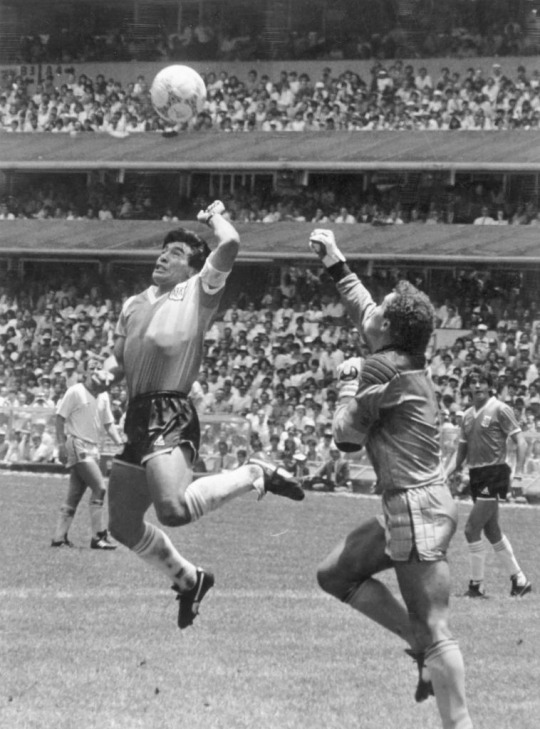
Maradona scored two goals during the quarter-final game in Mexico City on June 22, 1986, just four years after Britain and Argentina had fought a war over the Falkland Islands. The Argentine great’s first goal was ruled a header, but the ball had bounced off Maradona’s fist, out of sight of the referee.
Maradona said afterward that it had been scored “a little with the head of Maradona, and a little with the hand of God.”
Maradona’s second goal saw him dribble the ball past almost the entire English team before beating goalkeeper Peter Shilton. In 2002, it was voted “goal of the century” in a FIFA poll.
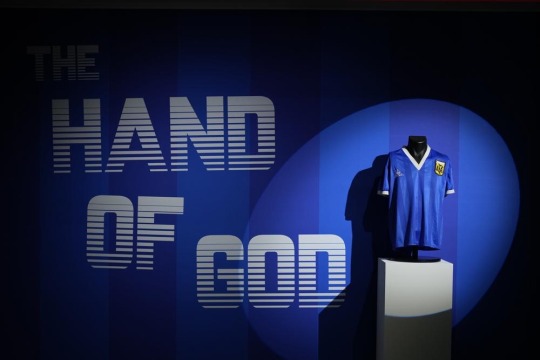
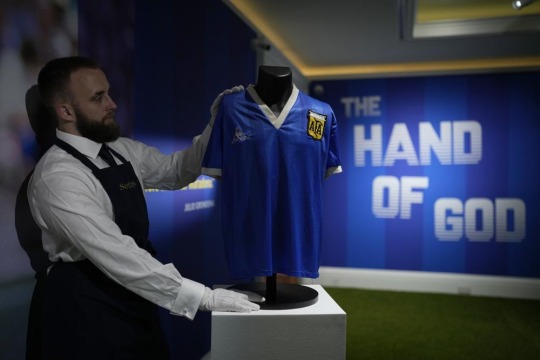

Argentina won the game 2-1 and went on to win the World Cup.
After the game Maradona swapped shirts with England midfielder Steve Hodge, who loaned it long-term to England’s National Football Museum in Manchester before putting it up for sale.
Maradona, considered by many to be the greatest player of all time, struggled with cocaine abuse and other excesses and died in November 2020 at age 60.
After Sotheby’s announced the coming sale last month, relatives of Maradona expressed doubt the blue No. 10 jersey was the shirt the soccer star had worn in the second half of the game, when he scored both goals. The auction house said the shirt’s identify was confirmed by sports memorabilia photo-matching firm Resolution Photomatching and confirmed by Sotheby’s chief science officer.
Brahm Wachter, Sotheby’s head of streetwear and modern collectables, said the shirt was “a tangible reminder of an important moment not only in the history of sports, but in the history of the 20th century.”
The previous record for sports memorabilia was $8.8 million paid at a December 2019 auction for the manifesto that launched the modern Olympic movement. The previous record for a piece of sportswear was $5.64 million for a Babe Ruth New York Yankees jersey in 2019.
The sale prices include an auction house charge known as the buyer’s premium.
0 notes
Text
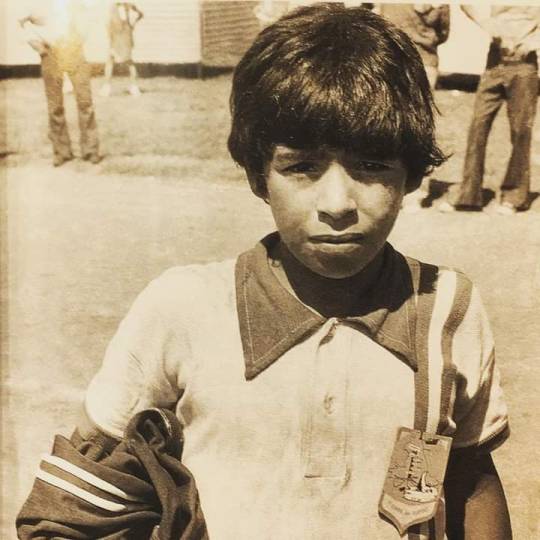
#barrilete#cosmico#futbol#argentina#pueblo#maradona#pelusa#latinoamerica#rebelde#pobreza#idolatria#fidel castro#izquierda#ícono#cultura popular#rebeldia#anti imperialism#cocaine#polemico#drogadicto#genio#decadente#soñador#mafia#violencia#irracional#sociedad#suciedad
15 notes
·
View notes
Text
Diego Maradona died???
1 note
·
View note
Quote
Napoli was where he would enjoy his most successful and ultimately most punishing times. The move to this noisy, crowded, overheated goldfish bowl of an existence - in which the Neapolitan criminal organisation, the ever-present Camorra, were involved from the start - was the moment Diego the kid from Fiorito became Maradona the brand. Suddenly he was more the character than the kid, falling in love with the notion of being Maradona, lapping up the glory and adulation yet always fully aware of just how asphyxiating the whole situation was. Cocaine became his new reality, a place of excitement higher than he had ever been before; his drug of choice removed him from the demanding realities of having to constantly demonstrate that you are the best player in the world. And in between it all came the moment that confirmed his status as something much more than merely a great footballer. How would things have transpired if Argentina had failed to beat England in the "Hand of God" match in the 1986 World Cup in Mexico, the "revenge" four years on of the defeat in the Falklands War? That match served to grant him immortality in the eyes of his country.
Guillem Balague, 'Maradona at 60: In search of the real Diego', BBC
#BBC#Napoli#Italy#Serie A#Camorra#Fiorito#Diego Maradona#cocaine use#Argentina#England#Hand of God#1986 World Cup#immortality
1 note
·
View note
Photo

#scarface#cocaine#drugs#tony montana#tony#the world is yours#dope#the north face#winter#sports#maradona#logo
17 notes
·
View notes
